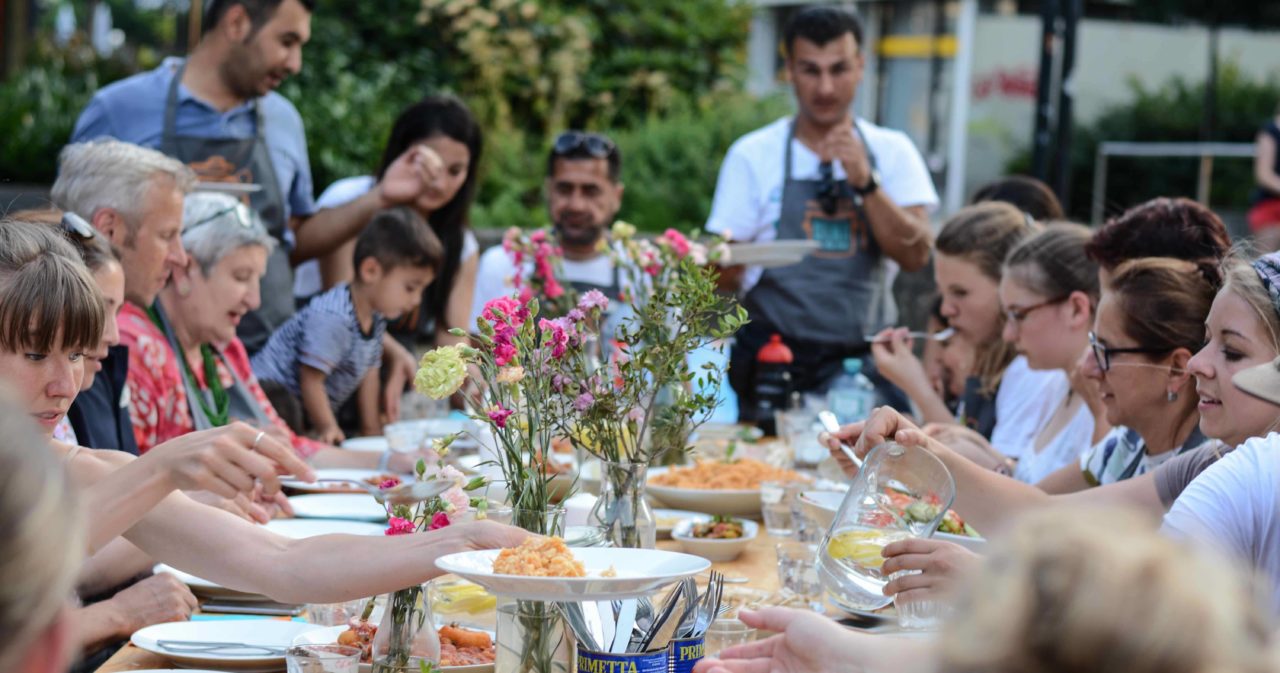 Strangers become friends
Strangers become friends
Countering prejudices and working together to shape integration
When Rama decided to leave her home country of Syria without her family or friends and come to Germany, she took a great step. As a woman travelling alone, she had it anything but easy on her flight and later on in the shared accommodation. By chance, she meets Mandy at a cooking evening organised by Über den Tellerrand and the two become close friends. "I immediately noticed that Rama is a very open person. From her I learned that I can live the way it feels right for me," says Mandy. "From Mandy I learnt that you need time for yourself. I take care of others a lot. Now I know that I also need to use the time for myself to develop personally," says Rama. Meanwhile, the two are good friends and actually neighbours. With Mandy's help, Rama has found a flat. Together they organise cooking and dance evenings so that people with and without a background as refugees can get to know each other.
Necessity
Places and opportunities for encounters between people of different origins in Germany on an equal footing.
Activity
Volunteers with and without a history of migration organise free cooking events and get-togethers.
Countable effort
Number of people of different origins, ages and genders per year who get to know each other informally.
Result
New friendships are formed between people with and without a history of migration, which help to find jobs, flats and language courses, and thus improve integration.
Systemic effect
Meeting and getting to know each other reduces prejudices, allows more people to feel at home in Germany, and society to come together.
Background
In recent years, Germany has become a place of refuge and a new home for people of the most diverse origins. As a society, we are thus faced with numerous challenges: How do we want to live together? What values are important to us? What makes us different? Only if we engage in exchange and answer these questions in dialogue will we find answers together and grow into a strong community. This works best through joint activities: When people take action together and do things with each other instead of for each other, encounters as among equals are created and friendships can grow (Phineo, 2019). However, the everyday life of the long-established and the new immigrants often differs greatly. Personal contacts hardly come about, and instead prejudices grow. Immigrants repeatedly emphasise the importance of social participation and friendly contact with people from the host society. These aspects are important factors in getting a job, learning the new language or finding a place to live. They help in feeling comfortable in the new country and in developing self-confidence (SVR, 2017). This is why there is a need for places and opportunities to get to know each other and to contribute with one’s skills. Social connection and participation are basic prerequisites for equal opportunities and a democratic society (FKB, 2020).
The good deed
With your good deed today, you make it possible for people with and without a history of migration to participate in free cooking events and get-togethers in over thirty large and small cities all over Germany. Cooking and eating together connects people all over the world and enables them to get to know each other more easily. Volunteers with and without a history of migration contribute their ideas and together create a sustainable social coexistence. When cooking, dancing, baking or gardening together, people come together as equals and friendships can grow. Participation is not only taught theoretically, but experienced practically. Your good deed thus lays the foundation for local social cohesion and creates visibility and exchange opportunities for committed people through a nationwide network. Getting to know each other personally at the kitchen table promotes tolerance and actively counteracts prejudice.

AboutGermany
Berlin
Capital
83,240,525
Number of inhabitants
45,724 USD
Gross domestic product per capita per year
6 of 189
Human Development Index
26 per cent of people living in Germany have a history of migration, two thirds of these "first-hand experience of migration", i.e. they were born abroad and immigrated (MDI, 2021).
About the organization and further information
Association
Über den Tellerrand e.V.
Website
https://ueberdentellerrand.org/

Further information and source
- Fachkommission der Bundesregierung zu den Rahmenbedingungen der Integrationsfähigkeit (FKB), 2020. Gemeinsam die Einwanderungsgesellschaft gestalten, Zarbock GmbH & Co. KG, Frankfurt am Main.
- Mediendienst Integration (MDI), 2021. Wie viele Menschen mit Migrationshintergrund leben in Deutschland?, Stand: 30.03.2021, Berlin.
- Phineo gemeinnützige AG, 2019. Zusammen stark sein - PHINEO-Themenreport zum Fördern des gesellschaftlichen Zusammenhalts in Deutschland mit ausgezeichneten Projekten, Qualitätskriterien und Fördertipps, DBM Druckhaus Berlin Mitte GmbH, Berlin.
- Sachverständigenrat deutscher Stiftungen für Integration und Migration (SVR), 2017. Wie gelingt Integration? Asylsuchende über ihre Lebenslagen und Teilhabeperspektiven in Deutschland, Studie des SVR-Forschungsbereichs und der Robert Bosch Stiftung, KÖNIGSDRUCK Printmedien und digitale Dienste GmbH, Berlin.




